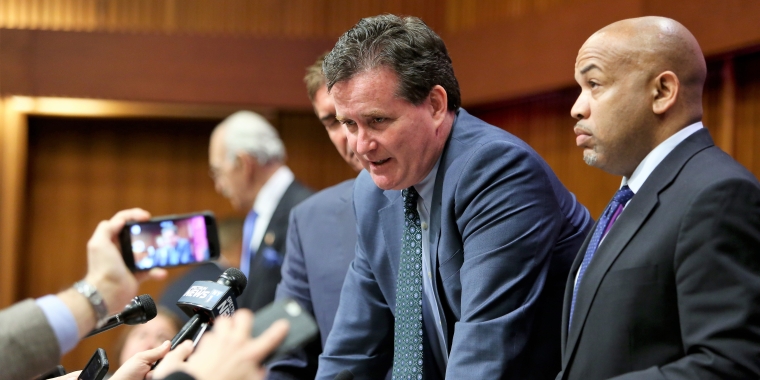
Senator Flanagan Announces Senate Budget Plan
John J. Flanagan
March 12, 2013
-
ISSUE:
- Budget
Senator John Flanagan (2nd Senate District) today voted for the New York State Senate’s 2013-14 budget resolution. The budget, which is an answer to the proposal put forth by Governor Andrew Cuomo in January, was formulated by the Senate Majority Coalition.
The Senate budget resolution, which will now be the focus of negotiations between the Senate, the Assembly and the Governor, focuses on helping businesses create new jobs, investing additional funds in education and transportation, providing needed tax relief for middle class families, restoring the property tax rebate program for senior citizens, providing mandate relief to local governments and restoring proposed cuts to women’s health programs and programs for the developmentally disabled.
The budget also includes a proposal for a permanent two-percent state spending cap.
“This budget proposal is a realistic approach that blends common sense budgeting with an emphasis on investing in our state’s future. The plan avoids balancing the budget on the backs of our most vulnerable residents and our students while protecting the programs they depend on. And it cuts taxes that will spur economic and job growth while rejecting any new taxes. It is a realistic and fair budget that will serve our state well,” stated Senator Flanagan.
Highlights of the Senate budget include the following:
AID TO EDUCATION
> Increases state school aid by $415 million above the level proposed by the Governor. This includes a full restoration of the High Tax Aid funding that was cut by over $50 million in Governor Cuomo’s budget proposal. Since much of this money is targeted directly at Long Island schools, its restoration was critical to the region’s schools and students.
> Raises community college base aid by $150 per student, and proposes exempting community colleges from the job-killing MTA payroll tax.
DEVELOPMENTALLY DISABLED
> Restores $120 million in cuts to the Office of People with Developmental Disabilities (OPWDD) to ensure the state continues to protect vulnerable New Yorkers.
HELPING BUSINESSES CREATE JOBS
> Rejects the Governor’s proposal to extend the 18a energy tax surcharge to provide over $2.5 billion in relief to families and employers over the next five years.
> Eliminates 1,000 needless regulations.
> Expands job training opportunities.
> Encourages businesses to hire military veterans.
> Proposes a two-percent state spending cap and a super-majority vote to increase state taxes.
> Eliminates the Corporate Tax entirely for 200,000 small businesses over the next four years ($250 million).
> Provides a 10-percent Personal Income Tax (PIT) exemption for business income by 2016 ($120 million) for 800,000 small businesses that pay personal income taxes.
> Eliminates the Corporate Tax entirely for manufacturers over the next three years, saving them $445 million.
> Invests in start-up companies and downtown revitalization.
FAMILY TAX RELIEF ACT
> Increases the dependent exemption from $1,000 per dependent to $2,020 per dependent.
> Increases the dependent care credit for the first time since 1999.
> Increases the child tax credit from $330 per child to $375 per child.
> Provides a new supplemental child tax credit of $500 per family.
> Restores STAR rebate checks for senior citizens.
FUNDING FOR WOMEN’S PROGRAMS
> Restores millions of dollars to critical women’s health programs cut as part of the Executive Budget proposal, including funding for: rape crisis centers, the Adelphi University Breast Cancer program, WIC, maternity/early childhood foundation, the prenatal and postpartum home visitation program, the Evidence Based Cancer Services Program (EBCSP) and programs to help domestic violence victims.
RELIEF FOR LOCAL GOVERNMENTS
> Accelerates the state takeover of the local growth of Medicaid (one percent cap in 2013 and a zero percent cap in 2014), saving counties millions of dollars and authorizes each county to perform a local audit of their program.
> Increases funding for the Aid to Municipalities Program (AIM) by $20.2 million.
> Increases CHIP funds for local road and bridge projects by $100 million.
> Establishes an independent Office of Risk Management.
> Authorizes the Comptroller and New York State Teacher’s Retirement System Board to make a long-term stable pension contribution option available to local governments, but modifies the Governor’s pension reform proposal to ensure localities can meet their financial obligations along with giving them additional flexibility.
SUPERSTORM SANDY
> Accepts the $30 billion in federal Sandy aid and calls for the establishment of an inclusive process for public input related to storm relief and recovery. Portions of the funds may also be applied to damage from Hurricane Irene and Tropical Storm Lee.
> Calls for examination of statewide certification and licensing programs for mold removal contractors.
> Makes generator hook-ups available for service stations statewide, if federal funds are available.
> Calls for the examination of the creation of a microgrid system to better protect New York hospitals and emergency care centers.
The plan also imposes a permanent state spending cap, a measure that the Republican-controlled Senate has repeatedly passed in prior years but which has yet to be adopted by the Assembly. Over the past two years, the state has saved $18.6 billion by adhering to a self-imposed two percent cap. Instituting a permanent cap on state budget would save New York , New York will save $11.2 billion over the next four years.
Share this Article or Press Release
Newsroom
Go to Newsroom
Honoring Our Veterans
November 9, 2017

Statement From Senate Majority Leader John J. Flanagan
November 1, 2017

